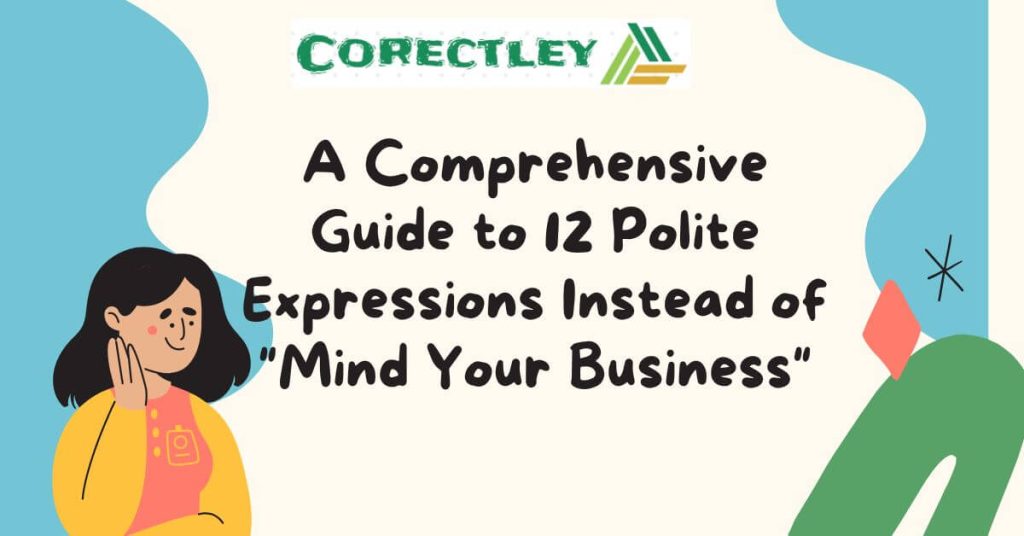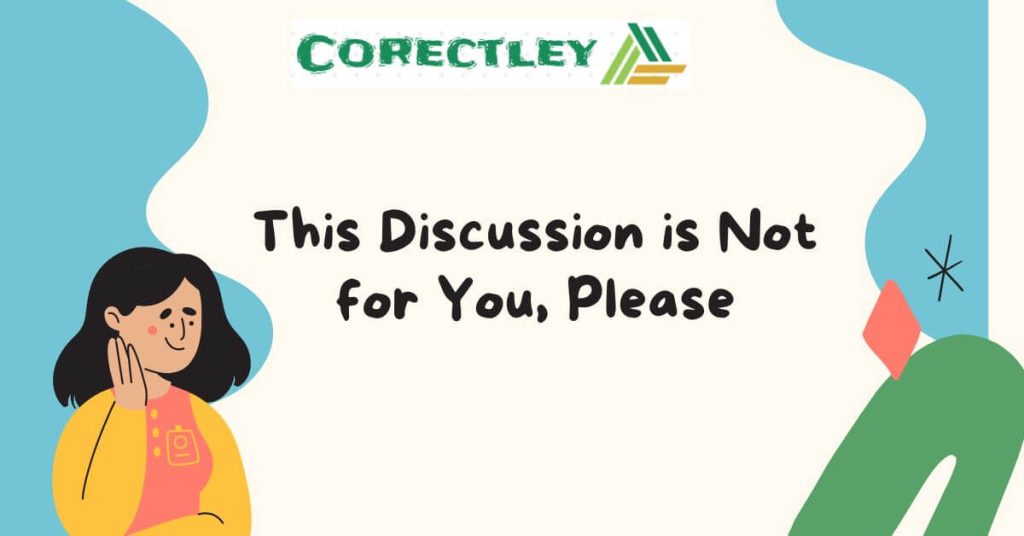At the point when you want persons to avoid your discussions, the least demanding comment is, “Mind your business.”
Despite its effectiveness, this phrase is far from respectful. Anyway, everything that alternate ways might you at any point say to persons to mind their business and avoid your concerns?
If you’re stressed over a superior way you can advise persons to avoid your business, then, at that point, this article is for you.
I’ll talk about 12 elective ways you can say, “mind your business” and get persons to impeccably figure out you.

12 Other Ways to Say “Mind Your Business.”
There are incalculable choices to “mind your business.” These articulations I’ll talk about are likewise extremely powerful to get people to comprehend that you don’t need them on your matter or in your discussion.
In addition, you can find them in the list below, whether you require something considerate or professional.
Likewise, assuming you additionally need something not even close to proficient, I’ll talk about some of them.
‘I’ll favor I remain quiet about this’, ‘I’d prefer to avoid this with anybody’, and ‘b^tt out!’ are a portion of the choices you can utilize when somebody tells you to “mind your business.”
The following are more articulations to utilize:
1. I’ll Prefer to Keep This to Myself
“I’ll prefer to keep this to myself” is an articulation to utilize when somebody has interrogated you regarding something you feel isn’t so much for them to be aware of.
It’s a decent and courteous approach to holding them back from asking more. ” I’ll like,” tells them straightforwardly and consciously that you would rather not examine it with them.
You can use this expression in a formal setting and even with your friends to better communicate with them.
The following are ways you can utilize this expression to assist you with seeing better:
- I’d prefer to keep this to myself. I want to believe that you grasp, Tony
- I’d prefer to keep this to myself. so we should not express more about this
2. I’d Rather Not Discuss This with Anyone
This is an articulation you use when you would rather not talk about it with anybody or especially with the person who has inquired.
Similar to the previous expression, it lets the person know right away that you don’t want to talk to them.
Along these lines, when somebody questions you about something you figure they shouldn’t have a clue about, this articulation can excuse them considerably or hold them back from discussing it.
You can always use this phrase by itself, or you can say more things like the following:
- I’d rather not discuss this with anyone, so how about we end it here
- I’d rather not discuss this with anyone, Let’s switch topics.
3. I’m Afraid You Shouldn’t Be Here
“I’m afraid you shouldn’t be here” is an articulation to utilize when you don’t need the presence of somebody around.
This would be successful with somebody who strolls into a conversation excluded or who joins a discussion that is not an issue for them.
This expression can be used to kindly dismiss them. I’m apprehensive” makes it more aware. Thus, you can continuously involve this articulation in an expert setting.
Here are instances of ways of utilizing it:
- I’m afraid you shouldn’t be here, kindly sympathetically leave
- I’m afraid you shouldn’t be here, James. This discussion isn’t so much for you
4. This discussion is Confidential
Secret data is intended for a specific arrangement of persons and not for people in general. So, if someone comes in uninvited, you can use this expression to let them go.
Additionally, regardless of whether they’re your companion, if somebody questions you about something you shouldn’t spread the word to them, you can tell them the conversation is private.
A friend ought to comprehend rather than inquire further. Thus, you can involve this articulation in a formal and casual setting.
Here are ways of utilizing this articulation:
- I can’t perceive you anything, this discussion is confidential
- this discussion is confidential, you ought not be here
5. This Discussion is Not for You, Please

This is another way you can advise somebody to mind their business. A direct assertion lets them know they ought not to be discussing the conversation in any case.
Additionally, the final “please” shows more respect. Along these lines, you can utilize this articulation with anybody to move them to avoid your matter.
It will work with someone who tries to contribute an unasked-for opinion to a discussion or who joins in and listens.
You can utilize this articulation alone or in the accompanying ways:
- This discussion is not for you, please. Thus, don’t ask once more
- This discussion is not for you, please. Please excuse us.
6. This is a Family Matter
Family matters typically pertain to families. Thus, when somebody outside the family attempts to participate in a family discussion, this is an answer for them.
Likewise, this is a reasonable response for somebody regardless of whether they’re your companion, who attempts to examine you concerning your family matter you mean not to impart to them.
The following are instances of this assertion:
- This is a family matter, Please accept my apologies I can’t discuss it
- It’s a family matter Mary, quit inquiring
7. It’s of no use to You
You can likewise utilize this articulation to tell somebody they ought to mind what is their business and not yours.
You can respond to someone who tries to get information from you by saying this. Telling them is of no utilization to them lets them know it doesn’t concern them.
Additionally, you should not use this expression in a formal setting.
The following are instances of this articulation:
- This information you seek is of no use to you. Therefore, stop asking;
- I cannot provide any information. It’s of no use to you
8. You Shouldn’t Bother
This is another way you can advise somebody to mind their business. This is a reasonable answer for somebody who’s requesting something you would rather not share with them.
It’s a casual approach to communicating how you feel about them doubting you.
At the point when you tell somebody they shouldn’t waste time with the data they are looking for, it lets them know in clear terms that you would rather not talk about it.
It tells them that they’d burn through their time attempting to inspire you to talk.
The following are ways you can utilize this expression:
- You shouldn’t bother. You will not get a single thing from me
- You shouldn’t bother with what you are looking for
9. Do You Mind Staying Out of It?
This is an extremely immediate inquiry that lets somebody know that you don’t need them in your business.
You can use this question to dismiss someone who brings up a topic you don’t want to talk about with them.
One more occasion is the point at which somebody attempts to join a discussion you don’t require them in, this is a reasonable response for them.
The following are ways you can utilize the articulation:
- Do you mind staying out of it? I needn’t bother with your viewpoint
- Do you mind staying out of it? I’ll request your recommendation when I want them
10. B^tt Out!
This is a long way from an expert or considerate response. Notwithstanding, you can likewise utilize this expression as opposed to saying, “Mind your business.”
It’s a stricter approach to telling somebody they’re not required regarding this situation. Besides, this is the sort of articulation you use with somebody who’s being a vermin.
It will work to let them know that you are upset about them being a disturbance.
The following are ways of utilizing this expression:
- B^tt out! You’re not required here
- B^tt out! You’re annoying me
11. I Don’t Need You Here
Compared to “I’m afraid you shouldn’t be here,” this is more stringent. Here, you’re being direct with them about requiring them out of your presence.
Though the previous could imply that the discussion isn’t so much for them that is the reason they ought not to be there, yet when you let them know you don’t need them there, it lets them know you thought about it all the more literally.
The following are ways you can utilize this articulation:
- I don’t need you here, could you at any point benevolently leave?
- It would be ideal for you to leave. I don’t need you here,
12. Nevermind
“Never mind” is a straightforward word that tells somebody you would rather not examine something with them.
At the point when somebody gets some information about something you don’t believe that they should be aware of, you can give this response.
You should be aware of the person you’re using this against because the majority of people believe it to be impolite; likely a colleague or an outsider.
You can utilize the word alone to excuse somebody you would rather not converse with or you can involve it in the accompanying ways:
- I would rather not discuss it
- It’s superfluous to you
Final Verdict
You can use phrases other than the common “mind your business” when you don’t want others to interfere with your business or conversations.
I have provided enough examples that are also effective if you want to be courteous and professional.
You can likewise conclude you need to be discourteous to somebody who’s being inconsiderate. Thus, you can look over the above models, as it suits you.